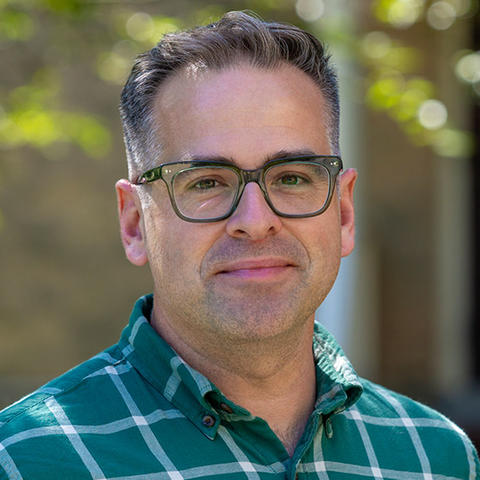Music for the Masses

Grace Coberly '21 says learning to play the ukulele and guitar are just "things you pick up as a music teacher."
Details
A music education teacher and composer, Grace Coberly '21, writes music for people. "I like relating to other people through music," they say.
A music education teacher at a Montessori school south of Boston, Grace Coberly '21 also sings with Lilith Vocal Ensemble and the Boston Cecilia, and in their spare time, writes commissioned pieces for other choirs. Even with all these accomplishments, Coberly says one of their most memorable compositions was written and performed at Haverford during their sophomore year. On kazoos.
“I wrote a piece as a joke,” Coberly says, but soon the Haverford Kazoo Chorus (or Kazorus) became a reality, performing its single show in the Visual Culture, Arts, and Media building with audience members joining in on their own kazoos.
This kind of support was instrumental in getting Coberly’s now-thriving career in music off the ground. Haverford has no formal music education program, and the music department was tiny at the time—Coberly was one of just four music majors. “But everyone was so down to help me forge my own path,” Coberly says. “They’re ready to go on the journey with you.”
A native of the Chicago suburbs, Coberly had dabbled in music early on, but always considered it nothing more than a hobby. “I thought I was going to be a Bryn Mawr creative writing major and stats minor,” they say. A few music classes and a winter break spent assisting in a children’s music classroom later, and a new path had emerged.
Today, Coberly attends classes to earn a master’s in music education while teaching full-time, singing in two choirs, and composing on demand. Among other honors, they were named a finalist for the American Prize in Composition for a piece composed while still attending Haverford.
Coberly credits their time singing in Haverford ensembles with helping them prepare for a career in music education “in a way that no class could.” From their leadership role with the Bi-Co Chamber Singers, Coberly learned how to fix a pitchy chord without hurting anyone’s feelings, and how to maintain morale during a chilly outdoor rehearsal in the rain.
And in the Mainliners (a now-defunct, mixed-voice, Haverford-only a cappella group), Coberly heard their own arrangements performed several times a semester. “This was my first experience workshopping my own music with a live group,” they say. “While my formal training has certainly helped me as a composer, I credit the Mainliners with teaching me how to write music for the human voice.”
That remains a major tenet of Coberly’s work. “I never wrote music just to write it,” they say. “I always write for people. I like relating to other people through music.”
Composing, teaching, and performing are all different ways they do that, and while it can be difficult to balance all three, Coberly maintains that they love them all equally.
“I love teaching,” they say. “The beauty of a kid finally realizing they can keep a steady beat—that’s such a joyful thing.” And commissions feel “more like awards than someone giving me a piece of paper. It’s people saying your work is valuable and interesting. That’s a huge ego boost.”
Coberly especially likes commissions for choirs, where they know a live human is going to sing their work. They often rely on public domain poetry as lyrics because, they explain, “There are more active and important words than in prose. I’m not interested in having people sing ‘and,’ ‘then,’ ‘the.’”
“These days, one of the most meaningful experiences I can have is to write music for my own ensembles,” Coberly says. This fall, an 80-voice choir in the Boston area will perform “The Lake Isle of Innisfree,” a piece Coberly originally wrote for the Bi-Co Chamber Singers and had only ever seen performed six feet apart and masked at Bryn Mawr due to the COVID-19 pandemic. “We premiered it at my final concert, which was released on YouTube,” Coberly says. “For several years, I’ve only had a recording to remind me of that moment. It’s so thrilling to watch this piece, perhaps my favorite of my own compositions, grow up and step out into the world.”
That, Coberly maintains, is where it belongs. “I don’t think music is something that anyone should do alone,” they say. “It’s designed to be shared in communities. All these things I do are just different ways to do that.”
—Jill Waldbieser




